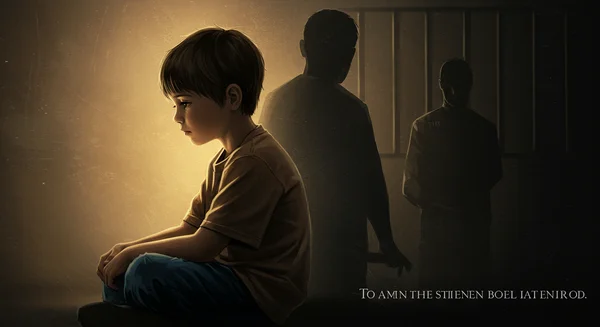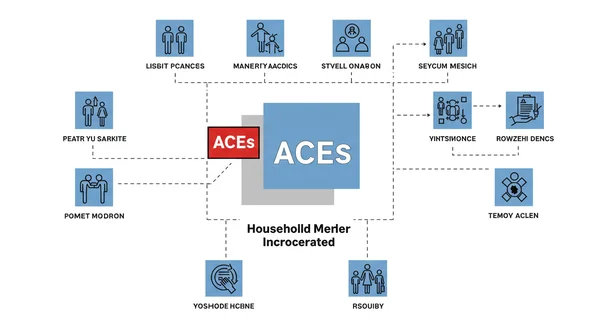Valutazione ACE sull'incarcerazione genitoriale: Comprendere il suo impatto e il percorso di guarigione
September 15, 2025 | By Jasper Quinn
L'infanzia è un paesaggio modellato da innumerevoli esperienze, ma alcune proiettano ombre più lunghe di altre. Tra le più profonde e spesso silenziosamente sopportate c'è l'avere un genitore in carcere o in prigione. Questa esperienza è un fattore significativo nel quadro dell'Esperienza Avversa nell'Infanzia legata all'incarcerazione genitoriale, un tipo specifico di Esperienza Avversa nell'Infanzia che può influenzare profondamente la vita di una persona. Cos'è la valutazione ACE e come può illuminare il percorso per comprendere il tuo passato? Per molti, riconoscere questa parte della propria storia è il primo, cruciale passo verso la guarigione e la scoperta di sé.
Questo viaggio di comprensione è profondamente personale, eppure non sei solo in esso. Milioni di adulti portano il peso di questa esperienza, spesso senza un quadro per elaborarne l'impatto. Il silenzio e lo stigma che circondano l'incarcerazione possono lasciare ferite profonde e invisibili. Riconoscere l'incarcerazione genitoriale come un legittimo trauma infantile convalida questi sentimenti e apre la porta alla guarigione. Se sei pronto a esplorare come il tuo passato possa modellare il tuo presente, puoi fare la valutazione ACE ora per ottenere preziose intuizioni.

Cos'è l'incarcerazione genitoriale come Esperienza Avversa nell'Infanzia (ACE)?
Lo Studio ACE originale, una collaborazione rivoluzionaria tra il CDC e Kaiser Permanente, ha identificato dieci categorie di avversità infantili legate a esiti a lungo termine in termini di salute e benessere. Avere un membro del nucleo familiare incarcerato è una di queste dieci esperienze avverse nell'infanzia fondamentali. Non si tratta solo dell'assenza fisica di un genitore; è un evento complesso stratificato con stigma sociale, turbolenze emotive e, spesso, instabilità finanziaria.
Comprendere questo specifico ACE significa guardare oltre la superficie. Riconosce la separazione improvvisa e forzata e l'incertezza che ne consegue. Questa esperienza può sconvolgere il senso di sicurezza, stabilità e attaccamento di un bambino, creando una base di stress tossico che può avere ripercussioni durature. Riconoscerlo all'interno di un quadro scientifico come la valutazione ACE aiuta a depersonalizzare la vergogna e a iniziare un'esplorazione più oggettiva dei suoi effetti.
Definizione dell'incarcerazione genitoriale come ACE
Come uno dei dieci ACE primari, l'incarcerazione genitoriale è definita come l'avere un membro del nucleo familiare che è stato incarcerato in qualsiasi momento durante i tuoi primi 18 anni. Questa esperienza è classificata come una forma di disfunzione familiare. Ha un impatto diretto sull'ambiente di un bambino, introducendo instabilità e disagio emotivo che possono alterare fondamentalmente il suo sviluppo. Questo non è un giudizio morale sul genitore, ma un riconoscimento del profondo fattore di stress ambientale posto sul bambino.
Il quadro ACE ci aiuta a quantificare questo stress. Rispondendo a un semplice questionario confidenziale, puoi vedere come esperienze come questa contribuiscono a un punteggio ACE complessivo. Questo punteggio non è un'etichetta ma uno strumento di consapevolezza, che ti aiuta a collegare i punti tra la tua infanzia e il tuo attuale benessere. Fornisce un linguaggio per esperienze che sono spesso difficili da articolare.

Il trauma trascurato: perché questo ACE necessita di riconoscimento
A differenza di altre forme di perdita, il trauma infantile associato all'incarcerazione genitoriale è spesso avvolto nel segreto e nella vergogna. Ai bambini può essere detto di mantenerlo segreto o di affrontare il giudizio di coetanei, insegnanti e persino altri membri della famiglia. Questa mancanza di riconoscimento aperto impedisce al bambino di elaborare il proprio dolore e la propria confusione, portando a sentimenti di isolamento e a un senso di diversità.
Dare un nome e un posto a questa esperienza all'interno dello studio ACE originale è profondamente validante. Conferma che il dolore, l'ansia e le sfide che potresti aver affrontato sono reali e significativi. Il riconoscimento è l'antidoto alla vergogna. Permette che le conversazioni abbiano inizio, che si formino sistemi di supporto e che gli individui comprendano finalmente che le loro difficoltà non sono un fallimento personale ma una risposta logica a una situazione profondamente avversa.
Gli effetti profondi e duraturi del trauma infantile dovuto all'incarcerazione genitoriale
Gli effetti a catena dell'avere un genitore incarcerato si estendono ben oltre il periodo di detenzione. Questi effetti del trauma infantile possono manifestarsi in ambiti psicologici, emotivi e comportamentali, spesso continuando fino all'età adulta. Lo shock iniziale della separazione può innescare una risposta di stress tossico, alterando lo sviluppo cerebrale e influenzando il modo in cui un individuo gestisce relazioni, emozioni e sfide per anni a venire.
Questi effetti non sono universali, ma i modelli sono ben documentati. Per molti, l'esperienza contribuisce a difficoltà con la fiducia, la regolazione emotiva e l'autostima. Comprendendo questi potenziali esiti, gli adulti che hanno vissuto questa situazione possono iniziare a identificare questi modelli nella propria vita e cercare strategie mirate per la guarigione e la crescita. Puoi iniziare questo processo ottenendo la tua valutazione gratuita del punteggio ACE.
Impatto psicologico ed emotivo: ansia, attaccamento e identità
L'impatto emotivo della perdita di un genitore a causa del sistema giudiziario è immenso. Può portare a tassi elevati di ansia, depressione e sentimenti di abbandono. Il legame di attaccamento primario di un bambino viene reciso, il che può creare stili di attaccamento insicuri che persistono nelle relazioni adulte, rendendo difficile formare connessioni strette e fiduciose.
Inoltre, il senso di identità di un bambino può essere frammentato. Potrebbe affrontare sentimenti di colpa o vergogna ereditati, mettendo in discussione il proprio valore. La confusione e la mancanza di chiusura riguardo all'assenza del genitore possono creare una narrazione interna di instabilità. Comprendere questo impatto psicologico è il primo passo verso la riscrittura di quella narrazione con compassione e forza.

Sfide evolutive e comportamentali: scuola, vita sociale e oltre
Lo stress dell'incarcerazione genitoriale spesso si riversa nel mondo esterno di un bambino, creando sfide evolutive. A scuola, i bambini possono avere difficoltà di concentrazione, portando a difficoltà accademiche. Socialmente, lo stigma può portare all'isolamento, al bullismo o alla difficoltà di fare amicizia. Il tumulto emotivo può anche manifestarsi come problemi comportamentali, poiché i bambini possono agire a causa di sentimenti che non possono esprimere verbalmente.
Queste sfide non sono segni di un "bambino cattivo" ma piuttosto di un bambino che lotta per affrontare circostanze travolgenti. In età adulta, queste prime interruzioni dello sviluppo possono tradursi in difficoltà sul posto di lavoro o nel mantenimento di reti sociali. Riconoscere la causa principale è essenziale per sviluppare meccanismi di coping efficaci.
Separazione familiare ACE: le dinamiche uniche di perdita e stigma
La natura della separazione familiare ACE attraverso l'incarcerazione è unica. Non è una rottura netta come una morte, né è tipicamente amichevole come alcuni divorzi. È una perdita ambigua, complicata da sentimenti di rabbia, vergogna e lealtà. Il bambino è lasciato a navigare in un mondo che spesso giudica la sua famiglia, costringendolo a una postura difensiva o ritirata.
Questa specifica dinamica di perdita e stigma la distingue da altre esperienze avverse. Spesso non esiste un rituale sociale per questo tipo di dolore, lasciando le famiglie a gestirlo in isolamento. Il caregiver rimanente è spesso sotto immenso stress, limitando la sua capacità di supportare pienamente i bisogni emotivi del bambino. Comprendere questo contesto unico è vitale per chiunque cerchi di guarire da questo particolare ACE.
Percorsi di guarigione e resilienza dopo l'incarcerazione genitoriale
Sebbene l'impatto di un'Esperienza Avversa nell'Infanzia legata all'incarcerazione genitoriale possa essere profondo, non deve definire la tua vita. Il tuo passato è una parte della tua storia, ma non è l'intero libro. Esistono percorsi chiari ed efficaci per la guarigione e la costruzione della resilienza, che ti consentono di andare avanti con forza e speranza. Il viaggio inizia con la consapevolezza e il coraggio di cercare comprensione.
Guarire non significa cancellare il passato, ma integrarlo nella tua vita in un modo che non ti controlli più. Implica la costruzione di una solida base di auto-compassione, la ricerca del giusto supporto e l'apprendimento di nuove abilità per gestire gli effetti persistenti del trauma. Molte persone scoprono che il loro punteggio ACE è un potente catalizzatore, fornendo un chiaro punto di partenza per il loro percorso di guarigione. Puoi scoprire i tuoi risultati in modo confidenziale e immediato.
Cercare supporto: terapia e approcci basati sul trauma
Uno dei passi più potenti verso la guarigione è trovare un supporto professionale. Cercare una terapia per il trauma infantile può fornire uno spazio sicuro per elaborare emozioni complesse senza giudizio. Un terapeuta formato nella cura informata sul trauma comprenderà l'impatto neurobiologico degli ACE e potrà offrire tecniche specializzate come la Terapia Cognitivo-Comportamentale (CBT) o la Desensibilizzazione e Rielaborazione attraverso i Movimenti Oculari (EMDR).
Trovare un gruppo di supporto con altri che condividono questa specifica esperienza può anche essere incredibilmente curativo. Condividere la propria storia con persone che comprendono lo stigma e la perdita unici può dissolvere i sentimenti di isolamento. Questa esperienza condivisa crea un potente senso di comunità e convalida, che è una pietra angolare della ripresa.
Costruire il tuo piano di resilienza: strategie per la crescita post-traumatica
Oltre all'aiuto professionale, puoi coltivare attivamente la resilienza nella tua vita quotidiana. La crescita post-traumatica è il cambiamento psicologico positivo sperimentato come risultato dell'avversità. Implica trovare nuovo significato e forza dalle tue lotte. Le strategie chiave includono:
-
Mindfulness e radicamento: Pratiche come la meditazione e la respirazione profonda possono aiutare a regolare il sistema nervoso, riducendo ansia e stress.
-
Costruire relazioni sane: Coltivare consapevolmente relazioni di supporto, stabili e fiduciose in età adulta può aiutare a guarire le ferite di attaccamento precoci.
-
Auto-compassione: Imparare a trattarsi con la stessa gentilezza che si offrirebbe a un amico è cruciale per superare sentimenti di vergogna e auto-colpa.
-
Stabilire confini: Stabilire confini sani è un atto di rispetto di sé che rafforza il tuo senso di sicurezza e controllo.

Comprendere l'incarcerazione genitoriale come un'Esperienza Avversa nell'Infanzia (ACE): il tuo primo passo verso la guarigione
Riconoscere che avere un genitore incarcerato è una significativa Esperienza Avversa nell'Infanzia è più che applicare un'etichetta. È un atto di profonda auto-validazione. Fornisce un quadro per comprendere le tue esperienze, un linguaggio per descrivere i tuoi sentimenti e un percorso fuori dalle ombre della vergogna e del silenzio. Il tuo passato non detta il tuo futuro, ma comprenderlo ti dà il potere di modellarlo.
Questa conoscenza ti permette di collegare i punti tra la tua infanzia e la tua vita adulta, dando un senso a schemi che una volta potevano essere confusi. È la chiave per sbloccare la resilienza e iniziare un viaggio consapevole di guarigione. Se questo risuona con te, il passo successivo è semplice. Fai la valutazione ACE gratuita sulla nostra piattaforma per ottenere una comprensione più chiara e scientificamente fondata delle tue esperienze in un ambiente sicuro e confidenziale.

Domande Frequenti sull'Incarcerazione Genitoriale e gli ACE
L'incarcerazione genitoriale è ufficialmente una delle 10 Esperienze Avverse nell'Infanzia (ACE)?
Sì, lo è. Lo Studio ACE originale del CDC-Kaiser Permanente ha identificato "avere un membro del nucleo familiare incarcerato" come una delle dieci categorie chiave di avversità infantile. Rientra nell'ombrello della "disfunzione familiare" ed è riconosciuto per il suo significativo potenziale di creare stress tossico e di influenzare il benessere a lungo termine.
Cosa significa il punteggio ACE se l'incarcerazione genitoriale è una delle mie esperienze?
Il significato del punteggio ACE è un riflesso della tua esposizione cumulativa alle avversità infantili. Se l'incarcerazione genitoriale è una delle tue esperienze, contribuisce con un punto al tuo punteggio totale. Un punteggio ACE più alto è correlato a un rischio maggiore di certi problemi di salute e sociali in età adulta. Tuttavia, il punteggio non è un destino; è uno strumento di consapevolezza che può guidarti verso strategie proattive di salute e guarigione. Comprendere il tuo punteggio può essere il primo passo in una nuova direzione.
Gli adulti possono davvero recuperare dal trauma infantile causato dalla separazione genitoriale?
Assolutamente. Sebbene l'esperienza lasci un impatto duraturo, la guarigione e il recupero sono del tutto possibili. Il concetto di neuroplasticità mostra che i nostri cervelli possono cambiare e adattarsi durante tutta la nostra vita. Attraverso il supporto terapeutico, la costruzione della resilienza e la promozione di relazioni sane, gli adulti possono elaborare il trauma, gestirne gli effetti e sperimentare una crescita post-traumatica. L'obiettivo non è dimenticare il passato, ma impedirgli di controllare il tuo presente e futuro. Per iniziare, fai la tua valutazione ACE per ottenere una comprensione fondamentale.